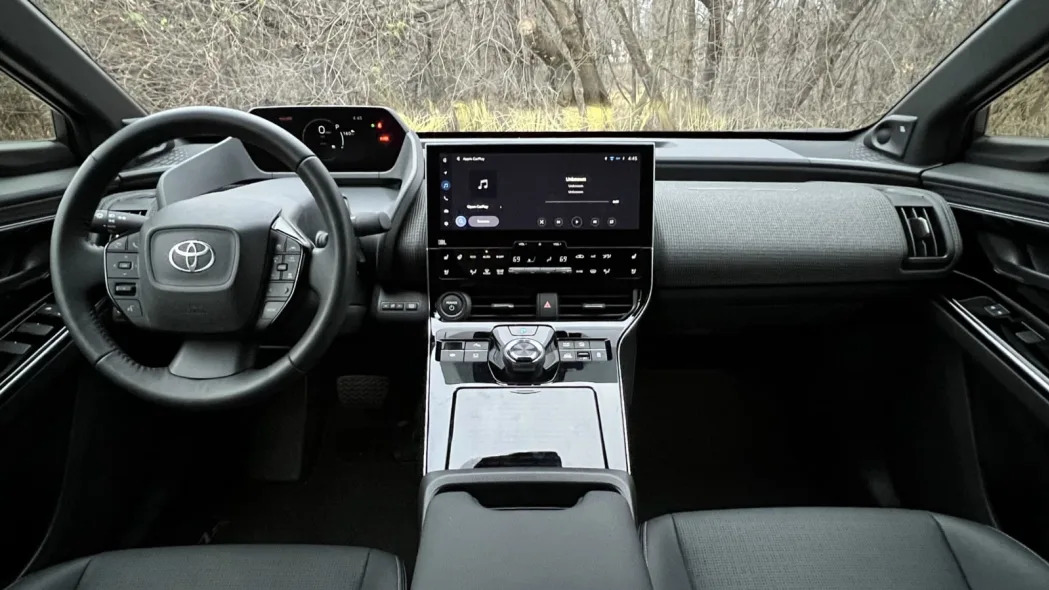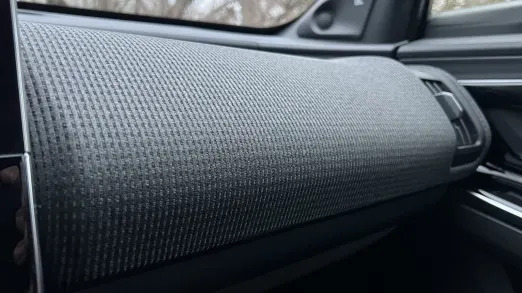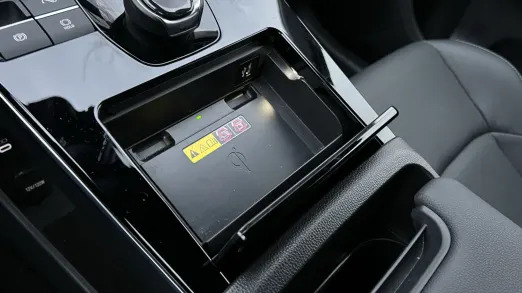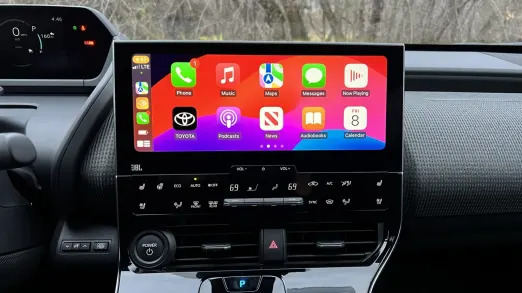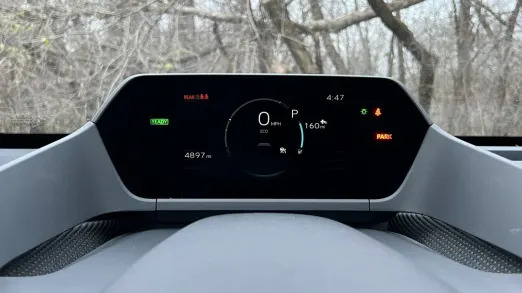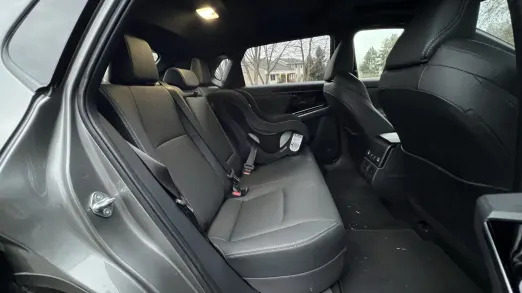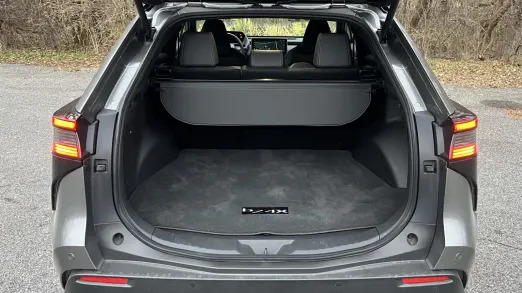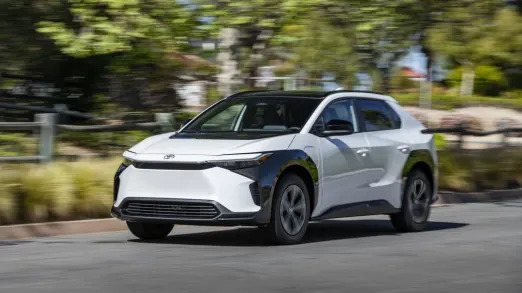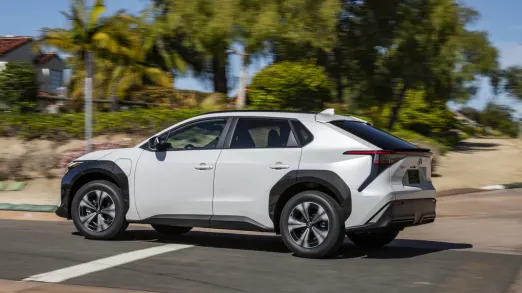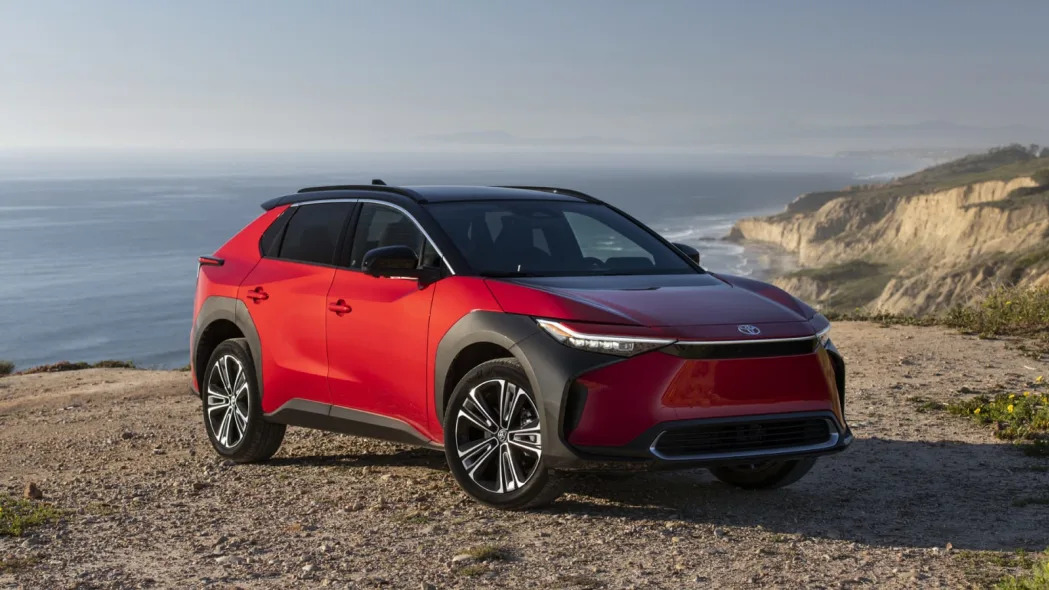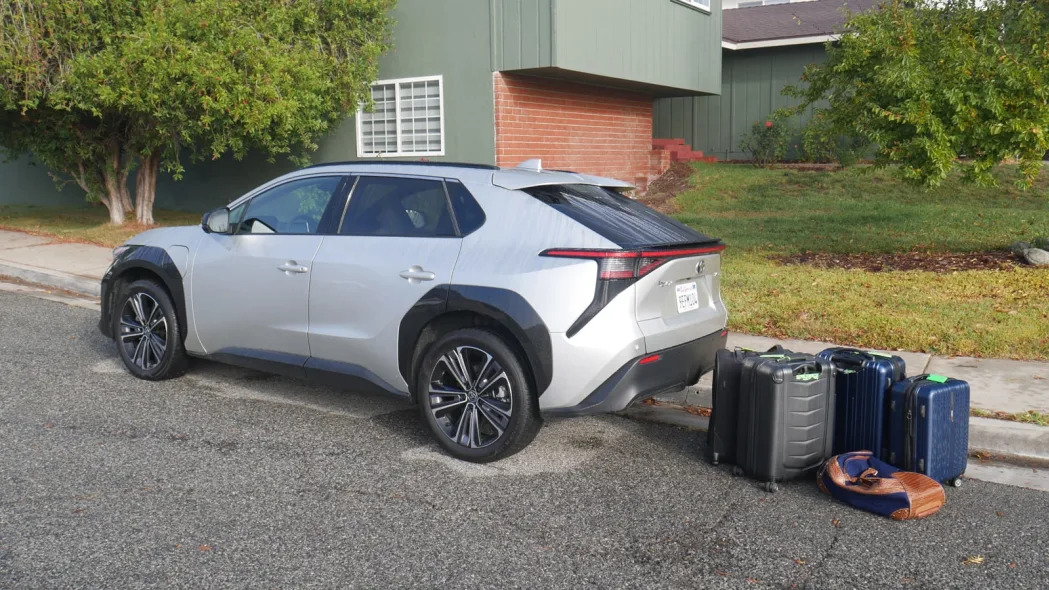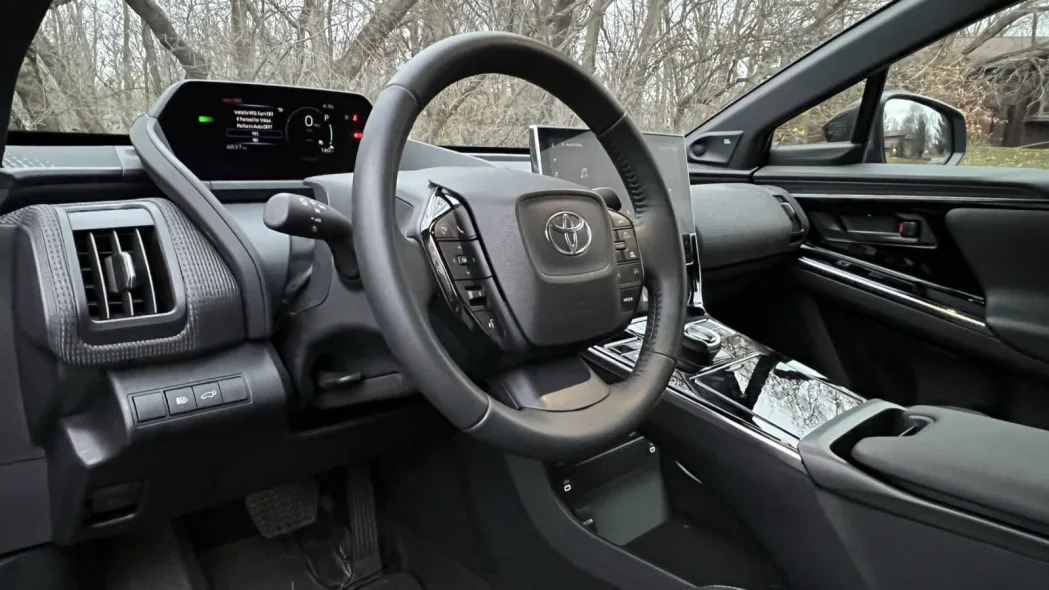Pros: Good value with FWD; a relatively conventional small SUV; ample cargo space for the segment; high ground clearance for an EV
Cons: Subpar range with AWD; slower to charge than some rivals; shine-in-your-eyes interior trim; hide-your-eyes styling
The 2024 Toyota bZ4X represents the second year on the market for Toyota’s first mass-market electric vehicle, and there are very few changes. It still represents a very cautious dipping of the toe into the battery-electric market with a safely and conservatively styled competitor in the popular compact crossover segment. The bZ4X doesn’t really do anything to raise the bar in terms of design, technology or electric powertrain. It’s a safe bet for someone, likely a repeat Toyota buyer, who likes the looks and feel of their RAV4 but wants to go fully electric. If that sounds like you, just know there are better options out there.
It’s also important to know that it is a virtual twin of the Subaru Solterra. One key difference: the Toyota bZ4X is available with either front- or all-wheel drive, whereas the Solterra is predictably AWD only. Its standard front-drive layout also stands it apart from many other EVs whose two-wheels-driven (and cheapest) option is usually a rear-wheel-drive layout. That means that going the value route with the base XLE FWD trim means you’ll secure the most driving range — 258 miles — while sacrificing little in drivability in the Snowbelt. Moving to all-wheel-drive or to the higher Limited trim, though, you’ll end up with lackluster driving range while taking a bigger hit to your pocketbook.
But that entry-level bZ4X does present a decent value with an appropriate level of equipment, interior quality and range. But someone asking more of their EV, and of the money they put down for it, will probably be better off with a Hyundai Ioniq 5, Kia EV6 or Volkswagen ID.4 rather than opt for a more expensive Toyota.
Interior & Technology | Passenger & Cargo Space | Performance & Fuel Economy
What it’s like to drive | Pricing & Trim Levels | Crash Ratings & Safety Features
What’s new for 2024?
The 2024 bZ4X carries over with a few minor changes to standard equipment. All versions now come with a dual-level (Level 1 and Level 2) mobile charging cord. The Advanced Park hands-free parking assist is standard on the Limited trim. The XLE trim gets a standard power liftgate and eight-way power driver’s seat. There’s updated charging information for range and charging time estimates in the infotainment system. Toyota also offers a year of free public charging at EVGo stations.
Also, you’ll see a small increase in pricing across the board.
What are the bZ4X interior and in-car technology like?
The bZ4X strikes a nice balance between functionality and achieving the more futuristic aesthetic typically demanded of an EV. Basically, it’s not too weird. There are physical toggles for temperature settings and the accompanying touch-sensitive climate buttons are illuminated and responsive enough (that said, we’d prefer a volume knob). The shifter is yet another new-fangled design that’s different for different’s sake, but is also easy enough to figure out. More basic vehicle functions are still served by buttons and stalks. We also like the abundance of storage up front, including an enclosed bin for your smartphone.
Unfortunately, that bin’s cover and the surrounding trim are gloss black, which horribly attracts fingerprints and managed to consistently reflect the sun into our eyes while driving. The gray fabric on the dash is a much more successful and glare-free interior adornment.
In-car technology is dominated by a standard 12.3-inch touchscreen, which is now common throughout the Toyota/Lexus empire. The graphics look good, and the system reacts quickly, but it’s a royal pain to click-click-click between the native Toyota system and Apple CarPlay/Android Auto. The navigation system also defaults back to its preferred map layout every time you open a different menu (we clicked North Up for a reason!), and there are some radio system layout oddities as well.
The bZ4X features a unique digital instrument panel placed roughly in between where traditional gauges and a head-up display would be in your line of sight. This means it’s above the wheel rim rather than under it. Shorter drivers might find the rim blocks some of the display’s bottom, but taller drivers should be fine.
How big is the bZ4X?
The bZ4X is about 4 inches longer and 2 inches lower than a RAV4, with 2.5 fewer inches of rear legroom, but that still makes it a compact SUV – just a slightly smaller one, not unlike a Mazda CX-5. It may be less able to fit a rear-facing child seat without scooting a front seat forward as a result of this.
Cargo space is also restricted compared to conventional compact SUVs because of its fastback roofline. The RAV4 has nearly 10 cubic-feet more volume than the bZ4X’s official figure of 27.7 cubic-feet. That said, our luggage test revealed that it could hold more stuff than the Hyundai Ioniq 5, Mustang Mach-E and Kia’s EV6 and Niro EV. Only the Volkswagen ID.4 proved to be more functional in the segment.
What are the bZ4X range and performance specs?
The front-wheel-drive bZ4X comes with a single electric motor producing 201 horsepower (about the same as the RAV4 Hybrid, though that weighs about 500 pounds less). It has a 71.4-kilowatt-hour battery pack that returns an estimated 252 miles of range with the XLE trim and 242 with the Limited.
The all-wheel-drive bZ4X has a pair of 107-horsepower motors, one for each axle. Together, they produce 214 hp – most all-wheel-drive electric vehicles have a substantial performance advantage over their two-wheel-drive versions. The advantage here is a much lower price. Although the AWD bZ4X battery has a similar capacity at 72.8 kW, it’s actually a different piece of hardware and gets notably worse range at 228 miles with the XLE and 222 miles with the Limited. These mirror the AWD-only Subaru Solterra.
What’s the bZ4X like to drive?
The main difference between the FWD and AWD bZ4X is good old-fashioned torque steer. Gun the FWD model mid-turn and the bZ4X goes all Saab Turbo on you, wrenching the tiny steering wheel in your hands as 196 pound-feet of torque instantly pours through the front wheels. With AWD, it’s drama-free. Ditto if you just go easy on the accelerator.
Once up to speed, you’d be hard-pressed to tell the difference. The bZ4X basically feels like a more substantial RAV4, the result of being 576 pounds heavier than a comparable RAV4 Hybrid with all that extra battery weight distributed evenly down low between a longer wheelbase as opposed to being spread out all over the place with an engine, transmission, battery, gas tank, etc. And before you scoff, remember that the RAV4 is a surprisingly pleasing little SUV to drive, with precise and nicely weighted steering paired with a suspension that maintains its composure if hustled. So be the bZ4X. It’s not as engaging as the RAV4 Hybrid’s SE trim levels, though (including the RAV4 Prime), and you definitely shouldn’t expect the sort of fun-to-drive experience you’ll get in the Ioniq 5, EV6 or ID.4. Still, as a commuter, it’s better to drive than most and benefits from a well-executed one-pedal drive mode that should do most of the braking for you around town and in traffic.
Now, should you want to get the bZ4X dirty, the all-wheel-drive version includes Subaru’s X-Mode off-road-specific drive mode that changes various vehicle systems to maximize traction. Its ground clearance is also much greater than all those other electric crossovers, though that goes for the FWD version, too.
What other Toyota bZ4X reviews can I read?
2023 Toyota bZ4X First Drive Review
In this review, we dig deeper into its design and engineering, plus what’s the deal with that name?
Toyota bZ4X and Subaru Solterra Luggage Test: How big is the trunk?
Spoiler: They’re better than the official volume number suggests
10 Thoughts About the 2024 Toyota bZ4X
From comfort to tech to what it’s like to drive, plus some other odd musings
What is the 2024 bZ4X price?
Pricing for the bZ4X is pretty simple. The XLE trim level starts at $44,420; the Limited starts at $48,530. Add $2,080 for all-wheel drive. The bZ4X is no longer eligible for a federal tax credit, but it may qualify for potential state-level tax credits or direct rebates.
As mentioned above, we think the bZ4X is most competitive with front-wheel drive due to its reasonable price, greater range and sufficient winter-weather traction (compared to RWD rivals). The XLE trim is also very well-equipped, especially as it now includes a power liftgate and a power driver seat. You can also add a Weather package to it that adds heated front seats and a heated steering wheel.
What are the bZ4X safety ratings and driver assistance features?
Every bZ4X includes a forward collision warning and automatic emergency braking system with pedestrian, cyclist, motorcycle (daytime) and guardrail detection. Also standard are lane-keeping assist, blind-spot warning and Safe Exist Assist, which uses the blind-spot warning sensors to alert occupants to approaching cars from the rear.
Third-parties haven’t published their crash test safety ratings for the 2024 model as of yet. The National Highway Transportation Safety Administration awarded the 2023 bZ4X its top five-star safety rating, and we don’t expect that to change for 2024. That includes five stars for overall front and side crash testing, and four stars for rollovers.
The Insurance Institute for Highway Safety gave the 2023 bZ4X its top “Good” rating for all crashworthiness categories, and its top “Superior” rating for day and night pedestrian crash prevention. It gave the headlights on the Limited trim its best “Good,” but gave the XLE’s headlights its worst “Poor” rating. Note that the IIHS’s ratings could change, as the organization has changed its criteria for 2024.


